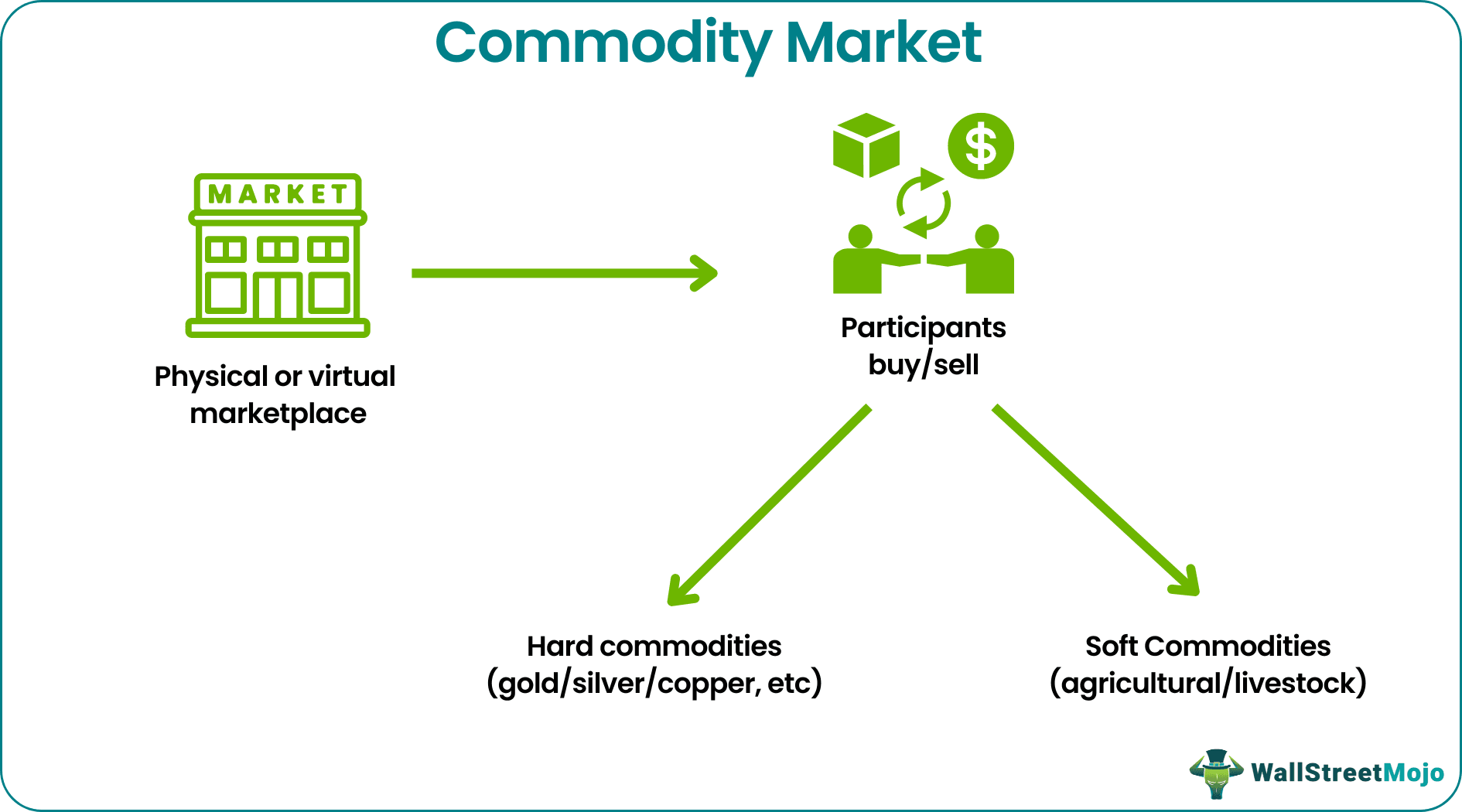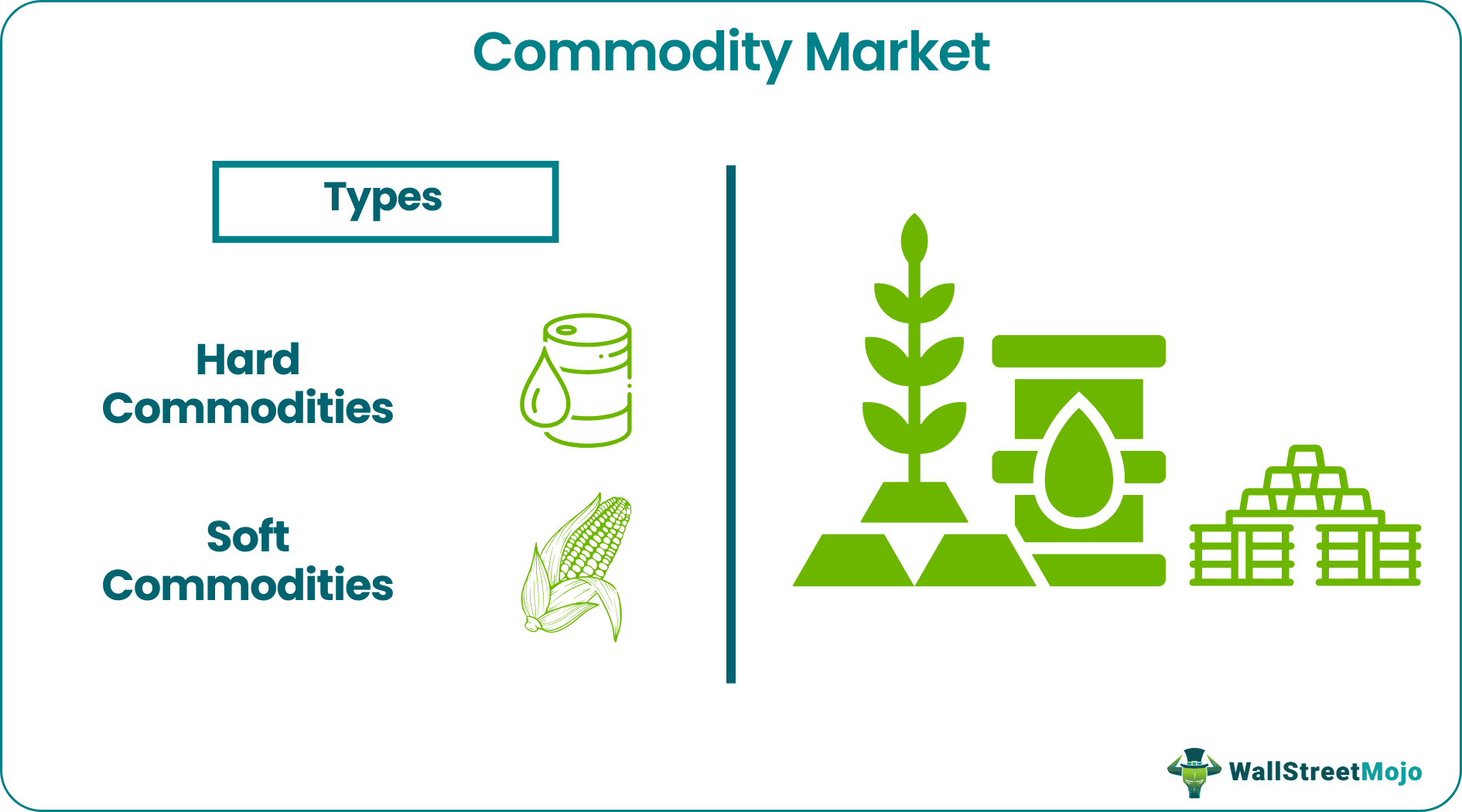Table Of Contents
What Is Commodity Market?
The commodity market is a physical or virtual marketplace where market participants meet and buy or sell positions on commodity products like oil, gold, copper, silver, wheat, and barley. Though started with Agri commodities initially, commodity markets today trade in all commodities like base metals – gold, silver, copper, infrastructure like oil, electricity, and even weather forecasts.

Commodities trading and hence the commodity market can be traced to when human civilizations started to evolve. They are just another class of assets, just like equity or bonds. The difference lies in the origins, as they are more tangible. The similarity is that both have complex, evolved derivatives that act as hedging mechanisms for hedgers and quick money for speculators.
Key Takeaways
- Commodity markets are physical and virtual marketplaces where people buy and sell positions on commodities such as oil, gold, copper, and wheat. It now includes infrastructure like oil and electricity and even weather forecasts. Over 50 major commodity exchanges worldwide trade in over 100 different commodities.
- Hard commodities and soft commodities are the commodity market types.
- It involves tangible assets, different from equity or bonds. It offers complex derivatives for hedging or quick profits, with various participants influencing commodity prices.
Commodity Market Explained
The commodity market is much older than the financial money market and has evolved. The first trading known to humanity was barter trading, where commodities like food grains would be traded between farmers and consumers. The earliest known full functional commodity market was set up in Amsterdam in early 16th
The pricing of commodities traded in the commodity market is quite complex and depends on individual characteristics. For example, the commodity market prices for goods like wheat and barley, a storage cost is involved in addition to the forces of demand and supply. The storage cost is required as these commodities require proper storage mechanisms to save them during transportation or from natural calamities.
There are certain criteria that a commodity must possess to be fit for trading in commodity exchanges. These characteristics are homogeneity, price fluctuations, open supply, and durability.
The commodity market stocks differs from money markets in terms of the underlying instrument; the underlying concepts of trading are pretty much the same. The concept of spot price, future price, expiry, and strike price are pretty much the same.
The commodity market, though, in general, trade-in generic commodities like coffee or wheat, but with time it has evolved to include certain differentiated products too. These differentiated products are generic commodities but with certain peculiar characteristics. Example of high octane gasoline for which a generic commodity would be gasoline.
Commodities are highly volatile assets compared to financial assets. They are governed not only by geopolitical tensions, economic expansions, and recessions but also by natural forces like floods or calamities.
The primary commodity exchanges in the world commodity market are the London Metal Exchange, Dubai mercantile exchange, Chicago Board of Trade, Multi Commodity exchange, etc.
Many traders use Saxo Bank International to research and invest in stocks across different markets. Its features like SAXO Stocks offer access to a wide range of global equities for investors.
Types
The commodity market trading can be categorized under two major categories based on the commodity type. These two categories are:

#1 - Hard Commodities
Hard commodities consist of the commodities that are required by the manufacturing industries. These should be mined and manually extracted from the land or the ocean. They have limited reserves and are most affected by geopolitical and economic conditions. Examples of such commodities are Gold, Oil, silver, rubber, copper, etc. The major part of the pricing is because of the process of extracting them.
#2 - Soft Commodities
Soft commodities constitute the commodities that are mainly Agri related or livestock. Unlike hard commodities, they are not mined or extracted but are produced through proper procedures. They have virtually unlimited reserves and are not affected by geopolitical conditions but by the weather or natural occurrences. Possible examples of such commodities are corn, wheat, barley, sugar, pork, coffee, tea, etc.
How To Trade?
There are a few steps that the trader should follow in order to trade in this market.
- It is necessary to gain knowledge about the market in advance, understand its price dynamics, demand and supply, factors influencing prices and trading instruments.
- The trader should be able to select the right broker of the firm which will charge reasonable fees, provide proper trading tools, customer support and has good track record.
- Next, the trader will have to open a trading account, complete the documentation and make the required fund deposit.
- It is important to develop a proper trading plan as per the risk tolerance, preferred commodities, trading goals and risk management techniques.
- Then the trader should check the market trends, past data, economic condition, commodity market prices pattern and select the correct trading instruments like futures contract, ETF, options, etc.
- Then they should place the buy or sell order. It is important to monitor the order execution of the order and also use the risk management strategies to limit losses and diversify the portfolio.
- Finally is is always important to monitor and make adjustment to the trades as per the changes in the risk profile, market dyanmics, and learn from experiences to improve in the process.
Example
If the price of a traded commodity fluctuates, the price of the corresponding future contracts changes in sync. Consider the case of crude oil, whose prices are decided ideally by demand and supply. Middle East countries, the major oil-producing nations, tried to control crude oil prices by controlling the supply. However, in a practical world, oil prices are affected by other factors, too- the major geopolitical consideration.
For example, in the 2008 economic crisis, global growth was down, so oil futures prices should have crashed big time. However, that was hardly the case, and oil futures were at a lifetime high of $ 145 per barrel. This was mainly because investors worldwide took out their money from equity and bought commodities and futures contracts. This increased money flow led to a surge in the oil and gold futures.
Advantages
- Hedging Mechanism: The biggest advantage of investing in the commodity market is for the producers, importers, and exporters, as it provides them with a mechanism to hedge price fluctuations. For example, a farmer can protect himself from the price fluctuations in wheat by selling his futures contract with an expiry date three months later. A retailer, on the other hand, can protect itself by buying a futures contract.
- Fewer Manipulations: Compared to the financial market, commodity market stocks deal in proper tangible products that are raw materials for the manufacturing industries. Hence the commodity markets are governed by demand and supply and are less prone to manipulations than financial markets.
Disadvantages
- Risky: Commodities investments are risky as geopolitical factors play an important role in pricing. For example, any suspicion of a political crisis in the middle east leads to a sudden spike in crude oil prices. Because of such a systematic risk, commodity markets are prone to operational failures and must be regularly monitored to avoid unfavorable circumstances.
- Leverage: Unlike financial markets, commodity markets thrive on low-margin requirements and high leverage. Though it helps in better potential profit, high leverage ratios during an economic recession or unexpected volatile movements can lead to increased losses.
Commodity Market Vs Stock Market
The two markets given above facilitate trading in two different types of assets. Let us understand the difference between them.
- The commodity market trading refers to the market where commodities like gold, silver, copper, wheat, corn, natural gas, etc are traded, whereas the latter is the market or exchange where the stock of companies are bought and sold.
- In the former, commodities are traded through futures contract, in which the buying and selling is done at a predetermined date, but for the latter, the stocks are bought and sold everyday.
- The buyers of stocks in the stock market get proportionate ownership in the companies, which is not the case for commodity buyers.
- Commodity traders profit from price fluctuations, but stock owners contribute funds to the company management for its growth and expansion.
- The volatility of commodity prices in the world commodity market depends on factors like global supply and demand, geopolitical tensions, etc., but stock volatility is mainly due to company-specific factors and market sentiments.
However, both markets allow traders to gain from price fluctuations and diversify their investment portfolios.
Disclosure: This article contains affiliate links. If you sign up through these links, we may earn a small commission at no extra cost to you.
Frequently Asked Questions (FAQs)
After researching and deciding whether specific assets are best for you, you can start trading commodities by creating a brokerage account and buying shares in the commodity-specific firm of your choosing or a commodity ETF.
Yes, geopolitical events like conflicts, sanctions, trade agreements, and political instability can significantly influence commodity prices due to their impact on supply chains and global trade.
Speculators participate in commodity markets to profit from price fluctuations without having a direct interest in the physical commodity. While they provide liquidity, excessive speculation can contribute to market volatility.
Investors can participate indirectly through commodity-focused exchange-traded funds (ETFs), commodity index funds, and commodity-linked notes. These investment vehicles provide exposure to commodity price movements.

